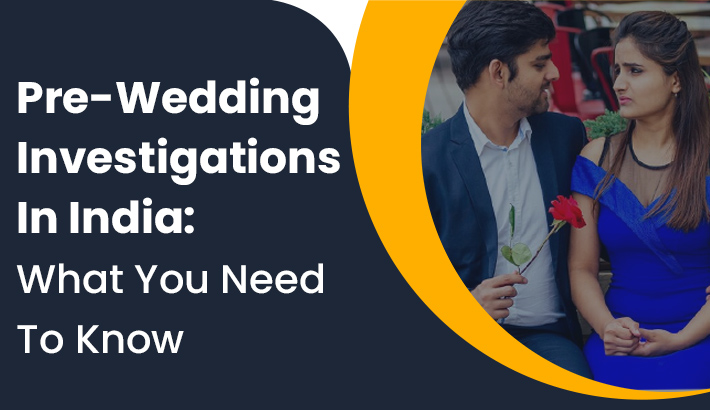In a country steeped in tradition like India, arranged marriages have long been the norm. Today, however, with a growing emphasis on individual choice and changing social dynamics, a new trend is emerging: pre-wedding investigations.
This article delves into the world of pre-marital investigations in India, exploring its purpose, the legalities involved, the information typically uncovered, and the ethical considerations one must navigate.
Why Consider a Pre-Wedding Investigations?
Traditionally, families played a central role in verifying a potential spouse’s background. However, with the rise of online matchmaking and a more independent approach to marriage, pre-marital investigations offer a way to assess compatibility beyond what families or matrimonial websites can provide.
Here are some of the reasons why couples or families might opt for a pre-marital investigation:
- Verification of Information: Often, profiles on matrimonial websites may contain inaccuracies or embellishments. An investigation can confirm details about education, employment, financial status, and family background.
- Character Assessment: Unearthing past relationships, criminal history, or any vices like excessive alcohol or drug use can help individuals make informed decisions.
- Financial Security: Debt, undisclosed liabilities, or a significantly different financial situation than portrayed can impact marital stability. An investigation can provide clarity.
- Medical History: Being aware of any pre-existing medical conditions in your partner or their family line can be crucial for future planning.
- Peace of Mind: A thorough investigation can alleviate anxieties and build trust, allowing couples to enter the marriage with a clearer understanding of each other.
What Does a Pre-Wedding Investigations Typically Cover?
The scope of a pre-wedding investigations can be customized based on individual needs and budget. However, some common areas covered include:
- Subject Identification Verification: Confirming the person’s true identity through documents like Aadhaar card and educational certificates.
- Educational Background Verification: Checking the authenticity of educational qualifications and attendance records.
- Employment Verification: Confirming current employment status, salary details, and past employment history.
- Financial Background Verification: Checking for any outstanding debts, loans, or involvement in legal disputes related to finances.
- Family Background Check: Investigating the family’s social standing, reputation, and any history of hereditary diseases.
- Character Verification: Discreet inquiries into the subject’s social life, past relationships, and potential involvement in any criminal activity.
- Social Media Investigation: Examining social media profiles to identify any inconsistencies with the information provided or potential red flags about lifestyle choices.
- Neighbourhood Inquiry: Discreet interviews with neighbors to gather insights into the subject’s behavior and reputation in their community.
Important Note: It is crucial to ensure that the investigation methods employed are legal and ethical. Privacy concerns and potential for harassment should be addressed with the chosen investigator.
The Legal Landscape of Pre-Matrimonial Investigations in India
There are no specific laws governing pre-marital investigations in India. However, the investigations must adhere to existing legal frameworks:
- Indian Penal Code (IPC): The investigator cannot employ any methods that violate the IPC, such as trespassing, stalking, or intimidation.
- Information Technology Act (IT Act): Gathering information through illegal hacking or surveillance is strictly prohibited.
- Right to Privacy: The investigator must respect the privacy of the subject and avoid any methods that could be considered intrusive or harassing.
It is advisable to choose a reputable and licensed private investigation agency that operates within these legal boundaries.
Ethical Considerations and Potential Issues
While pre-marital investigations offer valuable insights, there are ethical considerations to be aware of:
- Privacy Concerns: The subject of the investigation has a right to privacy, and investigations should not delve into excessively personal matters unrelated to the marriage.
- Potential for Bias: Investigators may have their own biases, and it is essential to choose a professional with a reputation for objectivity.
- Emotional Impact: Unearthing negative information can be emotionally devastating, and couples should be prepared to handle such revelations effectively.
- Focus on Compatibility: While background checks are important, the ultimate goal should be to assess compatibility and shared values, not just eliminate dealbreakers.
Finding the Right Investigator
Choosing the right investigator or hiring a trusted detective agency in Delhi, India is crucial for a successful and ethical pre-wedding investigations. Here are some tips:
- Research and Reputation: Look for agencies with a proven track record and positive client testimonials.
- Licensing and Accreditation: Ensure the agency is licensed by the government and adheres to professional codes of conduct.
- Transparency and Clear Communication: Choose an investigator who clearly explains their methods, fees, and limitations.
- Contract: Have a written contract outlining the scope of the investigation, timelines, fees, and confidentiality clauses.
- Comfort Level: Choose an investigator you feel comfortable with and trust to handle the investigation with discretion.
Costs Associated with Pre-Matrimonial Investigations
The cost of a pre-marital investigation can vary depending on the agency, the complexity of the case, and the geographical area covered. Typically, investigations range from Rs. 30,000 to Rs. 2 lakhs or more.
It is important to consider the cost as an investment in a secure and informed decision about your future spouse.
Alternatives to Pre-Wedding Investigations
While pre-marital investigations offer a structured approach, there can be alternative ways to gather information:
- Open Communication: Honest and open communication with your potential spouse is paramount. Discuss financial situations, family backgrounds, and any past relationships.
- Family and Friend References: Talking to close family members and friends of your partner can provide valuable insights into their character and lifestyle.
- Social Media Investigation (DIY): While exercising caution not to infringe on privacy, you can personally review your partner’s public social media profiles to get a sense of their interests and online presence.
The Final Decision: To Investigate or Not to Investigate
The decision to undergo a pre-marital investigation is a personal one. Here are some factors to consider:
- Comfort Level: If you have concerns or doubts about your potential spouse’s background, an investigation can provide peace of mind.
- Family Expectations: In some cases, families may insist on an investigation, especially for arranged marriages.
- Financial Investment: Weigh the cost of the investigation against its potential benefits for your long-term happiness.
Ultimately, a pre-marital investigation should be a tool to empower informed decision-making, not a means to create suspicion. Open communication, realistic expectations, and respect for privacy are key throughout the process.
Conclusion
In India, where tradition and individual choice are increasingly intertwined, pre-matrimonial investigation offer a valuable tool for couples entering into marriage. By shedding light on potential areas of concern and verifying information, investigations can empower couples to make informed decisions about their future together.
However, it is crucial to approach pre-marital investigations with caution and ethical considerations. Respect for privacy, awareness of legal boundaries, and a focus on compatibility alongside background checks are essential.
Ultimately, the decision to investigate rests with the couple. Open communication, realistic expectations, and a commitment to building a strong foundation for marriage should guide the process. By entering into marriage with a clear understanding of each other, couples can increase their chances of a happy and fulfilling union.


